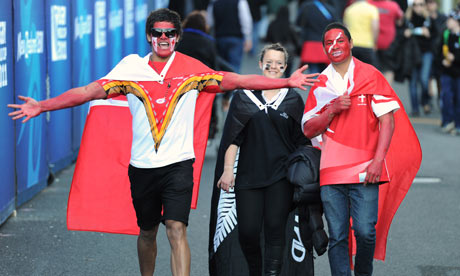
At some stage New Zealanders will look back proudly and pinch themselves at how effectively they nailed it. Not the final, which could have ruined everything, but the whole event. Staging a memorable Rugby World Cup, as England will discover in 2015, is only partially about the sport. The Kiwis embraced this crucial detail and clung tightly to it. The tournament will be favourably remembered long after the precise details of the All Blacks's narrow victory fade to grey.
For a country of only 4.3 million people it is no small achievement to host a global gathering with such laid-back aplomb despite the Christchurch earthquake and a global recession. Maybe it would have been harder had, say, Australia played France in the final. It helps, too, to be able to entertain overseas fans at a prime harbourside location right in the scenic heart of a major city. In the end, though, the secret was national fervour. From Southland to the Bay of Islands, the collective desire to show off New Zealand's multiple attractions made fools of those fearing a parochial non-event.
The only slight letdown was the inability of more teams to seize the moment and make life as tough for the All Blacks as the French did. Take away Ireland's win over Australia and Tonga's pool upset against France and, ultimately, not many results could be classified as unexpected. Disappointingly few sides, with the honourable exception of Wales, performed way above expectations. New Zealand's long black shadow, until their nerves caught up with them, cast every other team in an unflattering light.
It will not bother the All Blacks that they crawled over the line. They are not a great side yet but, in fairness, they were down to their fourth-choice fly-half. Even the French and the Welsh, one accurate James Hook goal-kick away from eluding all three of their defeats, would acknowledge they still have ground to make up. There is still something about the majority of All Black rugby players – their mana, their technical proficiency – which too many others lack. Graham Henry scarcely put a coaching foot wrong and you would never have guessed Richie McCaw's metatarsal was an issue at the tournament's pointy end. Israel Dagg did not look a complete world-beater in the final but you suspect he soon will be.
Yet amid all the black-themed euphoria – Auckland was a goth's paradise on final day – one or two issues cannot be casually swept up and thrown from the nearest ferry. The refereeing was distinctly patchy and the tier two unions still believe more could be done to help them. Japan's outgoing coach John Kirwan is among many seeking a better balance between driving financial growth and increasing the number of nations with a realistic shot of making the last eight. "I believe there's a sense of responsibility on the top teams in the world to help even the playing field," said Kirwan. "The key to improving nations such as Japan and Samoa is through competition. I appreciate it's a hugely congested season already but the likes of Japan need more regular competition against the big boys." If the International Rugby Board asked the likes of New Zealand and England to play in Apia, Suva, Tokyo or Tbilisi, the balance-sheet negatives would be more than offset by the wider interest and goodwill it would generate.
Given the IRB is embroiled in all kinds of internal strife, this is unlikely to happen any time soon. It continues to reflect poorly on the sport that its ruling turkeys continually manage to find fresh ways not to vote for Christmas. This simply cannot continue. If the 2011 World Cup highlighted anything, it is that flabby thinking will always be punished in the end. England are the most obvious example, having endured the kind of campaign that raised serious doubts about the judgment of several individuals.
Not all of it was the players' fault, just as some of the coaching staff will feel let down. But to shovel much of the blame on to the media, as the Rugby Players' Association and some players are still doing, misses the point to an embarrassing degree. Leadership, personal responsibility, humility, honesty … until the elite game in England faces up to its glaring deficiencies in many of those areas, as Wales have increasingly done, it will never realise its full potential.
Hosting the 2015 World Cup, in that respect, is a godsend for the RFU. Those in positions of power simply cannot afford to prevaricate, backbite and bluster any longer. If they do they will attract even greater global scorn than the union has already copped. It does not need half a dozen reviews to spell out the bleeding obvious: England need to play, behave and communicate with more intelligence and urgently require an off-field injection of integrity and vision, from overseas if necessary. As things stand, New Zealand, Australia, South Africa, France and Wales are all likely to be strong, committed challengers in 2015. If that prospect does not concentrate minds at Twickenham, nothing will.
Kitson's team of the tournament
I Dagg (NZ); C Jane (NZ), C Smith (NZ), J Roberts (Wales), D Ioane (Aus); R Priestland (Wales), K Fotuali'i (Samoa); R Roncero (Argentina), B du Plessis (SA), O Franks (NZ), J Horwill (Aus), V Matfield (SA), T Dusautoir (France), S Warburton (Wales), I Harinordoquy (France).
Replacements M Tincu (Romania), A Jones (Wales), D Rossouw (SA), R McCaw (NZ), D Yachvili (France), J Arlidge (Japan), F Steyn (SA).

